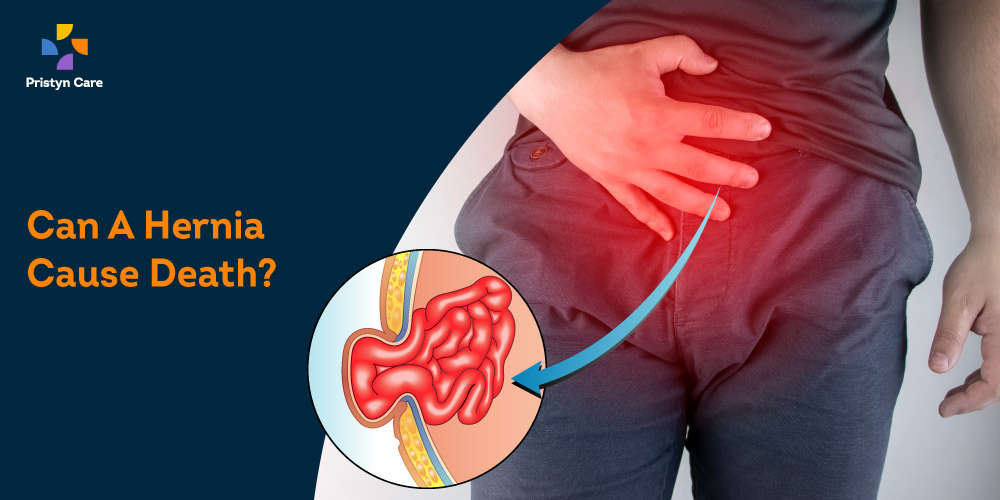
A hernia, in normal circumstances, does not cause death. A hernia is not a sudden emergency but a gradually progressing condition. Once diagnosed with a hernia, the individual will have ample time to determine the best line of treatment. However, if treatment is ignored and the hernia continues to progress or if the individual cannot push it back to the origin site, the hernia contents can be trapped (incarcerated) in the muscle wall. An incarcerated hernia can become strangulated, which means it can cut off the blood flow to the trapped tissues and lead to life-threatening complications, even death.
The ischemic changes (deficient blood supply to a body part) in the entrapped tissue cause excruciating pain and may cause neurogenic shock putting life in danger. The condition requires immediate surgical intervention. The trapped toxic materials may spread from the strangulated hernia to the nearby organs and can further deteriorate the patient’s overall health. The complications are irreversible and may often result in sudden unexpected death. The risk of this is higher in elderly patients.
Hernias generally develop because of congenital weakness of the muscles, birth defect in the diaphragm [muscle that separates the abdominal cavity from chest cavity], previous injuries, constant lifting of heavyweights, or during pregnancy. Although anyone can get a hernia, the elderly, obese, smokers, and people who have undergone surgery previously are more susceptible to getting hernias. A hernia occurs when an internal organ or body part protrudes through the muscle wall that holds it.
Speaking on the risks of hernia, Milind Joshi, General Surgeon working at Pristyn Care says, “Hernias aren’t lethal. Neither do they cause any serious harm. But, that does not mean the condition has to be underestimated. If not treated properly or promptly, hernias can lead to death in the worst-case scenario. But, on the other hand, the complications can be minimized, and life can return to normalcy without much effort.”
Mortality rate due to hernia
According to a study published by Pubmed, the mortality rate associated with an emergency hernia surgery is significantly higher than in elective hernia surgery. The study also stated that incarcerated hernias are the second most common cause of small bowel obstruction after adhesions. The leading cause of bowel strangulation (a blockage or obstruction in the intestine that keeps food or liquid from passing through the small or large intestine).
103,710 surgeries for groin hernia were performed between 1992 and 2004, out of which 292 patients died within 30 days of surgery. As per medical information retrieved from 242 deceased patients, in 5 of those patients, hernia surgery was done in addition to some urgent surgeries and therefore excluded from further analyses. 152 patients were admitted as emergency cases and 55 patients underwent bowel resection. Patients with a femoral hernia, especially women, were significantly less likely to need a groin examination compared to other patients.
Pubmed reported a case of sudden unexpected death due to strangulated hernia in a 60-year-old man in 2016. The man’s body showed signs of a potentially preventable and surgically correctable gastrointestinal condition identified as a hernia that got strangulated.
The overall mortality rate of strangulated groin hernias has been reported in the literature to range from 0.4 and 11 %.
A study published by the NCBI states that the mortality rate following elective surgery hernia repair (hernia operation in a non-emergency condition) is low, even if the patient belongs to elderly age. On the other hand, an emergency operation for a groin hernia carries a substantial mortality risk. Furthermore, after groin hernia repair, women have a higher mortality rate than men due to a greater risk for an emergency procedure.

Can Hernia cause Death?
How to know if a hernia is incarcerated or strangulated?
Ironically, there is no definite sign of early detection of a strangulated hernia tissue. This makes it difficult for hernia patients to understand when to end the ‘watchful waiting period’ and seek surgery for hernia repair.
But in the most common scenario, an incarcerated hernia is characterized by severe abdominal pain followed by tenderness at the incarcerated site, bloating, nausea, vomiting, intestinal obstruction, and even absence of bowel movements. Additionally, a hernia is considered incarcerated if it cannot be massaged back into the original cavity.
On the other hand, a strangulated hernia can be characterized by tenderness around the hernia lump, high counts of white blood cells, sudden severe abdominal pain, low blood pressure, and fever. Strangulation stems from herniated bowel contents passing through a restrictive opening that eventually reduces venous return and leads to increased tissue edema, further compromising circulation and stopping the arterial supply.
An incarcerated hernia is considered a medical emergency and almost always requires immediate surgery to avoid the risk of bowel obstruction. When a bowel obstruction occurs, food is unable to pass the intestines. An interruption of the blood flow to the bowel can lead to tears, infection and death of the tissues. Therefore, the condition requires prompt treatment to prevent serious complications.
Conclusion
A hernia is not a risky condition. Elective hernia surgery is a low-risk procedure too. A hernia takes multiple years to grow and eventually reach a stage where it could pose a threat to the individual’s life. According to NCBI reports, patients who need emergency hernia operations are approximately a decade older than patients who have received elective treatment. Hernia as a cause of death can be easily avoided. The only thing necessary is to understand that there is no better and more effective treatment than surgery. The sooner a person undergoes hernia repair surgery, the lesser the risks are and the easier it is to avoid the complications.
Also Read-
- Success Rate of Laparoscopic Hernia Surgery
- 3D Mesh Surgery For Hernia Treatment
- What to expect under Hernia Surgery?







